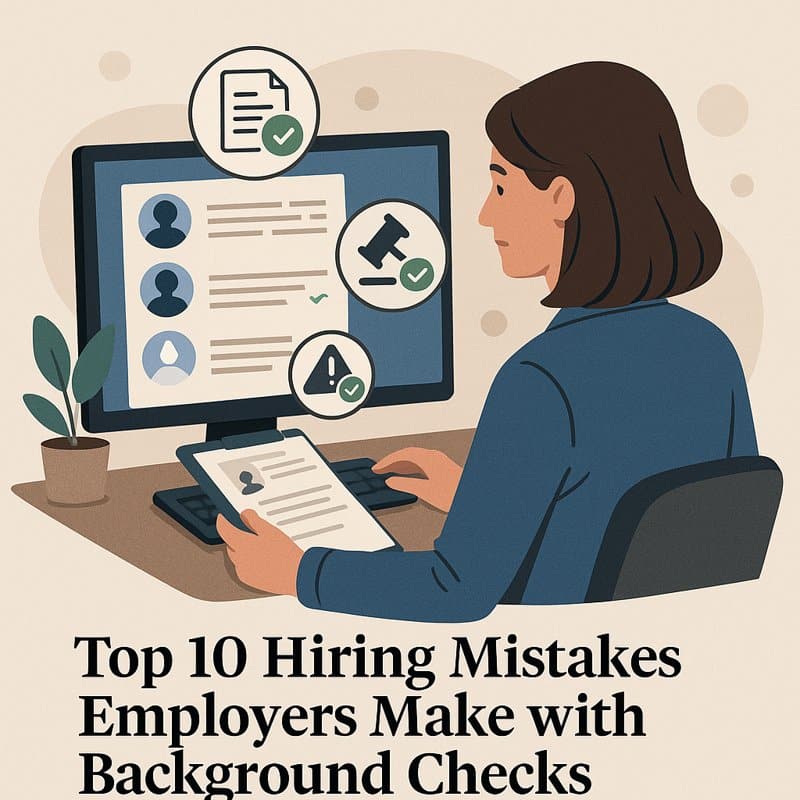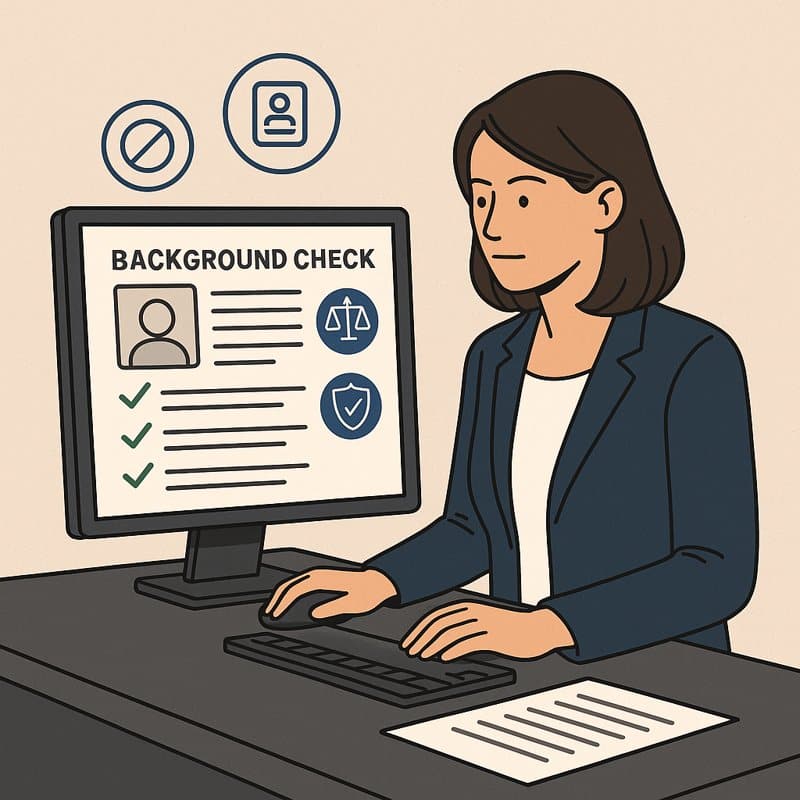Avoid these common errors to improve compliance, reduce risk, and make smarter hiring decisions.
Introduction

Hiring is one of the most critical — and legally sensitive — aspects of running a business. Every new hire represents both an opportunity and a potential risk. Employers conduct background checks to protect their organization, ensure compliance, and make informed hiring decisions.
Yet, despite good intentions, many companies make costly mistakes in how they perform and interpret background checks. These errors can lead to compliance violations, lawsuits, delayed hiring, and even reputational damage.
At The Screening Source, LLC, we’ve seen firsthand how small missteps can create big problems. This guide covers the 10 most common hiring mistakes employers make with background checks — and how to avoid them through proper procedures, technology, and compliance awareness.
1. Failing to Provide Proper Disclosure and Authorization

Under the Fair Credit Reporting Act (FCRA), employers must give job applicants a clear, standalone disclosure stating that a background check will be conducted. They must also obtain written authorization before proceeding.
Common Mistake: Combining disclosure forms with other application paperwork (such as consent for drug testing or employment terms).
Why It’s Risky: Courts have ruled that combining forms violates the FCRA’s “standalone” rule, exposing employers to class-action liability.
How to Fix It:
- Use a dedicated FCRA disclosure and authorization form.
- Ensure it’s separate from other onboarding documents.
- Partner with a Consumer Reporting Agency (CRA) like The Screening Source that provides compliant templates.
2. Ignoring State and Local Laws
Federal law is only part of the picture. Many states and cities — like California, New York, Illinois, and Philadelphia — have “Ban the Box” or Fair Chance Hiring laws that limit when and how criminal history can be considered.
Common Mistake: Applying a one-size-fits-all policy nationwide.
Why It’s Risky: State-specific requirements can differ dramatically, leading to legal exposure if employers fail to adapt.
How to Fix It:
- Stay updated with state-by-state background check laws.
- Implement dynamic screening workflows that adjust by location.
- Read our companion article: Background Check Laws by State — 2025 Edition.
3. Taking Adverse Action Without Following Proper Steps
When background check results affect a hiring decision, the FCRA’s Adverse Action Process must be followed.
Common Mistake: Sending rejection emails or withdrawing offers before providing candidates the chance to review and dispute their reports.
Why It’s Risky: Skipping pre-adverse action or sending incomplete notices can lead to penalties and lawsuits.
How to Fix It:
- Send pre-adverse action notice, copy of the report, and “Summary of Rights.”
- Wait 5–7 business days for the candidate to respond.
- Send the final adverse action notice if no dispute is made.
✅ The Screening Source automates this process to ensure every step is properly timed and documented.
4. Using Outdated or Inaccurate Data Sources
Not all background check providers are equal. Some rely on outdated or incomplete databases that fail to capture recent records or display inaccurate information.
Common Mistake: Choosing the lowest-cost provider without verifying data integrity.
Why It’s Risky: Outdated data can lead to unfair hiring decisions or false reports — a major FCRA violation.
How to Fix It:
- Verify your provider is a certified CRA with audited data sources.
- Review data refresh schedules and court retrieval methods.
- Partner with a provider like The Screening Source, which integrates county, state, and national sources with continuous updates.
5. Applying Blanket Policies That Ignore Job Relevance
Not all offenses are relevant to every role. Employers must consider whether a criminal record is job-related and consistent with business necessity (EEOC guidance).
Common Mistake: Automatically disqualifying candidates based on any criminal history.
Why It’s Risky: Blanket exclusions can result in disparate impact discrimination claims under EEOC and FCRA laws.
How to Fix It:
- Conduct individualized assessments considering the nature of the offense, its age, and job duties.
- Document every decision for audit purposes.
- Provide candidates the opportunity to explain or dispute results.
6. Forgetting to Recheck or Rescreen Employees
A background check is only accurate at a single point in time. Many employers stop after initial hire — but post-hire issues (like revoked licenses or new convictions) can create future risk.
Common Mistake: Treating screening as a one-time process.
Why It’s Risky: Ongoing compliance and safety can be compromised without continuous monitoring.
How to Fix It:
- Implement annual or continuous background checks for safety-sensitive or regulated positions.
- Learn more in our related article: The Rise of Continuous Background Screening: Is It Right for Your Company?.
7. Mishandling Sensitive Information
Background checks involve highly confidential data — Social Security numbers, addresses, and criminal records. Employers are responsible for protecting this data under both FCRA and data privacy laws (like CPRA, CCPA, and GDPR).
Common Mistake: Storing or emailing reports without encryption or secure access.
Why It’s Risky: A data breach or unauthorized access can lead to regulatory penalties and reputational damage.
How to Fix It:
- Use encrypted portals for report storage and sharing.
- Restrict access to authorized HR personnel only.
- Follow data retention and disposal policies recommended by your CRA.
8. Not Training Recruiters or Hiring Managers
Even with a compliant system, people can make mistakes when they don’t understand the rules.
Common Mistake: Failing to train internal HR and hiring staff on FCRA and EEOC compliance.
Why It’s Risky: Missteps in communication or documentation can undo all compliance efforts.
How to Fix It:
- Conduct annual FCRA and EEOC compliance training.
- Provide quick-reference guides for recruiters.
- Audit recruiter communications and decision logs.
9. Overlooking International or Remote Workers
With remote and global hiring now common, employers often hire outside traditional jurisdictions.
Common Mistake: Running U.S.-based background checks for international candidates without verifying local regulations.
Why It’s Risky: Global data privacy laws vary widely — and some prohibit exporting personal data.
How to Fix It:
- Partner with a provider offering international background checks compliant with local laws.
- Review consent requirements for cross-border data transfers.
- See related: Remote Hiring & Background Checks: How to Vet Candidates Anywhere.
10. Not Partnering with a Trusted Screening Provider
Perhaps the biggest mistake of all is assuming all background check vendors are the same. The reality? Only a certified Consumer Reporting Agency (CRA) ensures compliance, accuracy, and reliability.
Common Mistake: Choosing providers that don’t understand your industry or compliance requirements.
Why It’s Risky: Inconsistent reporting, missed jurisdictional rules, and lack of documentation expose your organization to serious liability.
How to Fix It:
- Work with a trusted CRA partner like The Screening Source.
- Ensure the provider follows FCRA, EEOC, and state regulations.
- Request audit support and legal updates regularly.
Conclusion: Build a Better, Safer, More Compliant Hiring Process
Background checks are vital for building trustworthy teams — but only when done right.
Avoiding these ten common mistakes protects your business from risk, reduces hiring delays, and strengthens your reputation as a fair employer.
At The Screening Source, LLC, we provide nationwide, FCRA-compliant background screening solutions that combine speed, accuracy, and compliance. Whether you’re a Fortune 500 company or a small nonprofit, we tailor our services to your exact hiring needs.
Partner with The Screening Source
Streamline your background screening process and ensure total compliance with FCRA and EEOC standards.
📧 info@thescreeningsource.com
☎️ 860-591-5225
🌐 https://thescreeningsource.com
